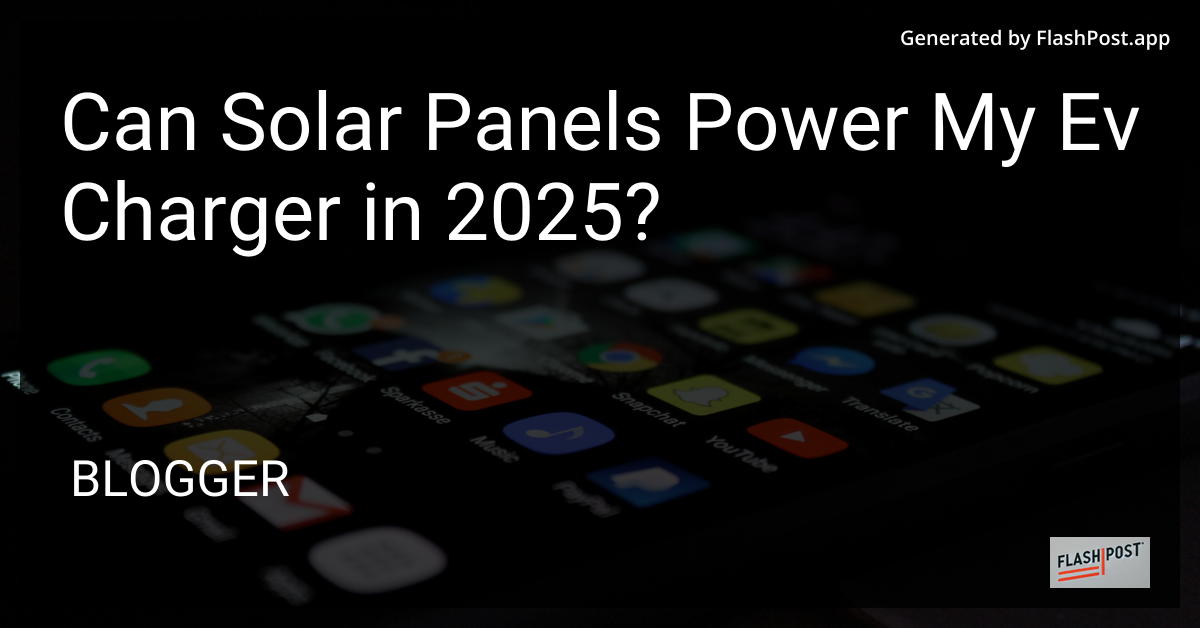Can Solar Panels Power My Ev Charger in 2025?

Can Solar Panels Power My EV Charger in 2025?
With the rapid advancements in renewable energy and electric vehicles (EVs), many homeowners are considering the possibility of harnessing solar power to charge their electric vehicles. As we look towards 2025, it’s an excellent time to evaluate whether solar panels can effectively power your EV charger.
The Growing Appeal of Solar Power
Solar power has become increasingly accessible and affordable over the past few years. With advancements in photovoltaic technology, solar panels have become more efficient, allowing homeowners to generate substantial amounts of clean energy from their rooftops. By 2025, it’s expected that solar energy will play an even more significant role in reducing reliance on non-renewable energy sources.
Solar Panels: The Basics
Solar panels convert sunlight into electricity through photovoltaic cells. This electricity can be used in real-time, stored in batteries, or even fed back into the grid. The efficiency of modern solar panels allows homeowners to generate much of the power they need for household use, and perhaps even enough to charge an EV.
Charging Your EV with Solar Power
Charging an EV directly from solar power in 2025 will depend on several factors, including:
System Size: The number of solar panels and the overall capacity of your solar system are critical. A typical home solar system ranges from 5 to 20 kilowatts (kW).
Energy Usage: Your household’s energy consumption patterns impact how much solar energy is available for EV charging.
Battery Storage: Coupling solar panels with a battery storage system can help store solar energy generated during the day for use at night or during cloudy periods.
Calculating Your Needs
To determine if solar panels can power your EV charger, you’ll need to calculate your EV’s electricity requirements. For example, if your electric vehicle requires 30 kWh to fully charge and your solar system generates 40 kWh per day, you might find solar a feasible option, especially with adequate energy storage solutions.
Benefits of Solar-Powered EV Charging
Opting for solar-powered EV charging delivers several benefits:
- Cost Savings: Reduce or eliminate your reliance on grid electricity, lowering your monthly energy bill.
- Environmental Impact: Utilizing solar energy reduces your carbon footprint and contributes to a sustainable future.
- Independence: Producing your own energy adds a level of energy security and protection from rising electricity costs.
The Future of Solar and EVs
As electric vehicles continue to grow in popularity, supported by electric vehicle rebates, and with extensive electric vehicle charging infrastructure being developed, the feasibility of solar-powered charging increases significantly. The synergy between solar and electric vehicles represents a key part of a future that is both energy-efficient and sustainable.
Conclusion
By 2025, powering your EV charger with solar panels is not just a possibility but a smart choice that aligns with both economic and environmental goals. With the continuous improvements in both sectors, the transition to a solar-powered electric vehicle is poised to be smoother than ever. Whether you’re planning for a new solar installation or upgrading your existing setup, now is the time to explore how solar energy can support your green driving aspirations.
For more insights into the evolving world of EVs, explore the landscape of electric vehicle competitors 2023 to understand how innovation is shaping the future of personal transportation.
Comments
Post a Comment